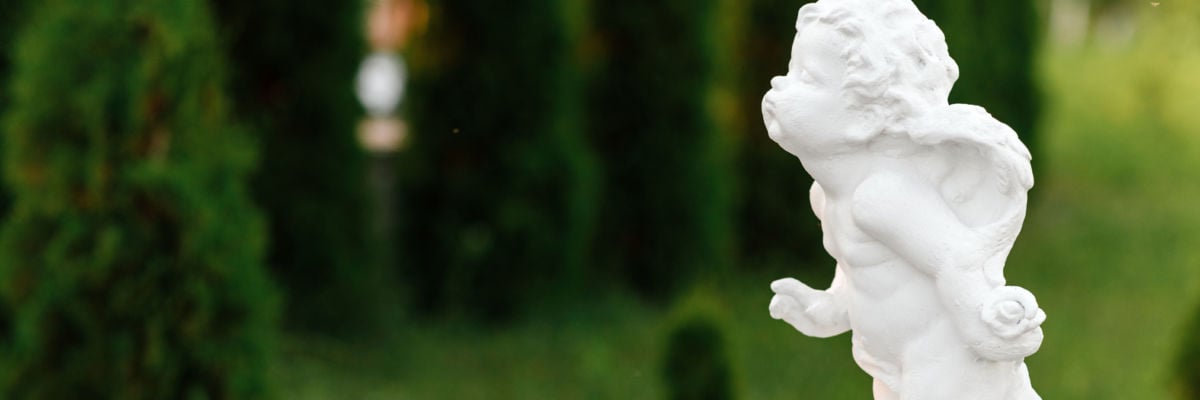
Catholic tradition has affirmed that God gives each human person a guardian angel to accompany him through life. The Catechism of the Catholic Church (336) says that “from its beginning until death, human life is surrounded by [angelic] watchful care and intercession. Beside each believer stands an angel as protector and shepherd leading him to life.”
Some might think that tradition “childish.” Well, Jesus said the kingdom of heaven belongs to children (Matt. 19:14) and that, unless you become one, you won’t enter it (18:3).
Why the resistance to guardian angels?
A certain brand of liberal theology would dismiss angels, period. It would write them off to simply divine appearances (as if God masquerades?). That theological streak is highly influenced by a “critical” approach to biblical studies that seems allergic to the idea of the supernatural (except for God). To me, a methodology dealing with God that is suspicious of the supernatural is fundamentally flawed.
St. Thomas Aquinas speaks of an orderly hierarchy to being: things to animated beings, starting with simple plants to animals (alive but without rational faculties) to man (corporeal-spiritual creature with rational faculties) to angels (spiritual creatures with rational faculties) to God (spiritual Creator and source of reason). Besides, denying angels puts you at odds with a lot of the ordinary Magisterium of the Church, including Lateran IV and Vatican I, both of which speak of God as Creator of all things “visible and invisible” (something we say every week at Mass that we believe). Denying angels would be equivalent of saying we believe that God could have created “invisible” creatures . . . but he just didn’t? (Note that Vatican II also mentions angels, taking their existence as given—see Lumen Gentium 49, 50, 66, and 69.)
On the flip side, classical Protestant proclivity to “Jesus Christ as my personal Lord and Savior” tends to turn salvation into an individualistic endeavor (despite supposed antipathy to “good works”). Classical Protestant hostility is also grounded in resistance to prayer to the Blessed Virgin Mary and the saints.
At least classical Protestant theology does not succumb to rationalism, acknowledging that the Bible is populated with angels. But then why would angels be seemingly just bystanders in the drama of salvation?
Vatican II captures the whole perspective of the Old and New Testaments when it teaches, “God . . . does not make men holy and save them merely as individuals, without bond or link between one another. Rather has it pleased him to bring men together as one people, a people which acknowledges him in truth and serves him in holiness” (Lumen Gentium 9). God did not make a covenant just with individual Jews, who, at a certain critical mass, turned into “Israel.” Rather, one entered the covenant by becoming part of Israel. The Church is not an “optional extra” in our relationship with Jesus. Rather, being engrafted into the body of Christ means incorporation into that mystical body extended in space and time by the Church.
So salvation is not a solo sport. Neither is the struggle for salvation. Ephesians 6 makes clear that the fight for salvation is a cosmic one, involving “spiritual forces that control evil” (sounds a lot like fallen angels). We’re also told we are “surrounded by a cloud of witnesses” (Heb. 12) who are more than just spectators. That sounds a lot like the “communion of saints.” Why would we think God would send his beloved son or daughter alone into that kind of environment?
The idea, then, that God surrounds people with spiritual support, with guardian angels, is not just a nice pious thought, a residual hangover of polytheistic protective deities, or a childish wish projection. God wants our salvation even more than we do and knows what we are up against.
There is a strong motif in both Catholic and Protestant circles about the struggle for salvation as spiritual battle. “Onward, Christian Soldiers” is a good Protestant hymn example. But soldiers are parts of something bigger, called armies—they are not brigades or regiments comprising a bunch of individual guys serendipitously doing the same thing for the same purpose. And, until the Last Day, why do we think that Christians who have gone home to the Father have been put on the retirement list rather than active duty in a spiritual battle nerve center?
Given that salvation is not a solo sport, why would we expect the angels, God’s “messengers” (the etymology of angelos), not to have an active part in bringing God’s work—salvation and consummation of the universe—to completion?
Salvation is a—no, the “communion of persons,” or communio personarum. Salvation is ultimately communion with the absolute Communio Personarum called the Trinity. So why would we expect God, who saves us in that communio, not to help us with the communio of our own angelic guardian to show us the way, so that “God may be all-in-all” (1 Cor 15:28)?
And, against those who dismiss the guardian angels as “childish,” let us take consolation from this tradition. We live in a world in which so many people are dying of loneliness, who feel alone and abandoned. So many are even tempted to suicide. Awareness of our guardian angel should give us the comfort to realize that we are not alone, that we have a shepherd, guide, coach, and friend who sees our struggles, shares our crosses, and does not abandon us. Why, then, would you not talk to such a person . . . even when that “talk” is called “prayer”?
Angel of God, my guardian dear
To whom God’s love entrusts me here,
Throughout my life, be at my side,
To light and guard, to rule and guide,
Amen.



